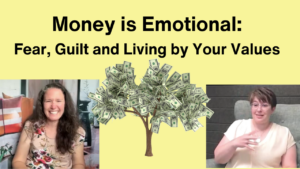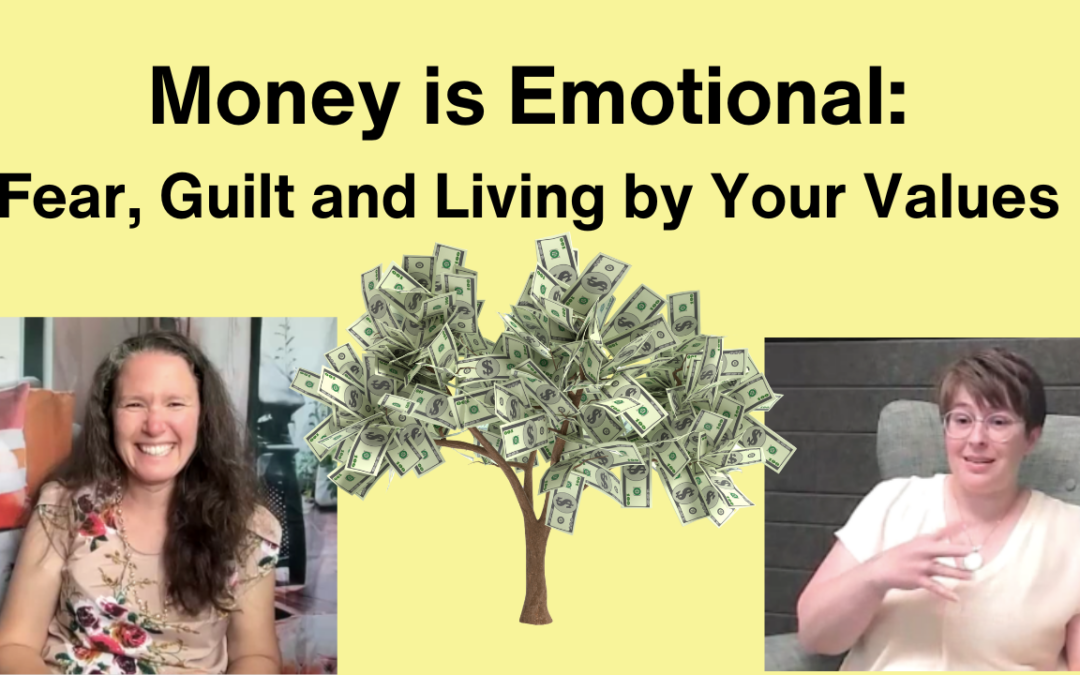In this fourth installment of my Financial Therapy Series, I talk with Dr. Robin Norris about emotions and money. How deeply rooted emotions—like fear, scarcity, guilt, and confusion—impact our relationship with money. This is not about budgeting tips; it’s about the emotional patterns underneath. We explore how therapy can be a tool for creating healthier boundaries, living by your values, and reshaping the way you define wealth and worth.
Watch the video and see the whole series on youtube here. Or read the transcript below.
Opening: Why We’re Talking About Emotions and Money
I am Maggi Colwell with Chiron Art Therapy in Columbus, Ohio.
And I’m Dr. Robin Norris with Windward Optimal Health in Northern Virginia.
And today we’re gonna be talking about the emotional pieces of money, like guilt, scarcity, shame, fear, confusion. And some of what we see in our clients, and some of what we see in ourselves and our experiences, both personal and professional with these things.
This is part of a series that we’ve been doing together talking about financial therapy and what that is, what it can look like, and what it can do.
The Emotional Weight of Money: Fear and Scarcity
Money isn’t just numbers, it’s deeply emotional. In this conversation, we’ll explore…
Let’s talk a little bit about fear when it comes to money.
I think a lot of people that I talk with have a sense of, like, it’s hard to say this out loud, but, like, if I spend this money now, then I’m not going to have it later.
And that shows up in ways of, like, oh, I could really use some extra support in therapy right now, but I don’t want to spend that money.
Or, I know that there’s this issue I want to deal with, or, like, I just went through something big, but I don’t want to spend the money.
And we kind of get into this scarcity mentality around it.
Guilt and the Struggle to Invest in Yourself
And sometimes that’s paired with guilt, too.
So I’ve had clients who are dealing with loss, dealing with transitions, and they’re spending money on therapy and saying, “I just feel guilty because I can afford this, but this is expensive, and not everybody can afford it.”
And I think that guilt really gets in the way of allowing people to take care of themselves and get what they need.
Therapy as a Practice in Boundary Setting
Right. I also think therapy allows people to practice boundary setting around money, which is something that we don’t necessarily get tools for.
I think if you’re in a family where there isn’t a lot of money, there’s just this felt sense that you’re not allowed to ask for what you need.
And if you’re in a family where there’s plenty of money, but maybe emotional resources are lacking, or there’s a lot of strings attached to that money, there can be a sense of, “I’m only allowed to have what I earn.”
So when somebody’s investing in therapy, it’s sometimes the first time they are allowed to have something that they didn’t have to overfunction for.
Sudden Wealth, Legacy Planning, and the Lack of Tools
Yeah. Because that scarcity mindset comes from a place of worry.
And I also see it in folks that do have money, or they come into money in different ways. And there’s so much concern about doing the right thing, or this pressure to use it wisely.
And when we get into that, then it’s easy to get confused, and it’s easy to get paralyzed, because there’s not tools around how to handle it, or how to think about legacy.
Or how do I make sure I’m doing the right thing with this? And am I being selfish? Or am I helping my family?
And when there’s not clarity in that, it just gets murky, and it gets stuck.
Common Emotional Patterns: Confusion, Shame, and Grief
 So some of the topics that you and I have thought about today were the shame piece.
So some of the topics that you and I have thought about today were the shame piece.
And I think that’s real.
I think another piece that we see a lot in clients and ourselves is confusion. And what I’ve been noticing a lot lately is grief.
When you have to set a financial boundary, and you’re no longer rescuing somebody or making someone feel better, or if you have money and somebody else doesn’t and you can’t fix it for them, that grief of not being able to make things better is heavy.
And sometimes people just don’t want to feel that.
Living in the Present vs. Planning for the Future
What side of that is about the worry and the fear and the anxiety of not having enough in the future, and not knowing the future?
And, like, some of that has been about understanding how to make decisions that are based on your values in the present moment.
And recognizing when that fear is hijacking your ability to make a decision that actually could be very good for you.
So there’s a difference between, “I’m just gonna go on a shopping spree,” versus “I’m gonna make a conscious choice to work on this issue or get support because that’s something that’s aligned with my values and something I want for myself.”
And in that way, it is a gift to yourself.
The 168-Hour Rule: A New Definition of Wealth
Right. It reminded me one of the fav, one of my favorite tools is “168.”
So you and I and everybody listening has 168 hours a week.
That’s the only thing that we all have the same amount of.
We all have different family, different money, different bodies, different neighborhoods. But we all have 168.
And so if we’re not aligned in our values, and we’re not spending time doing what we love, or at least moving toward what we love, we’re not really creating a life of value.
Redefining Wealth: Time, Energy, and Emotional Capacity
And, you know, that starts to say like, what do we actually consider wealth?
Like, are we wealthy because we have a huge bank account but no time and no capacity to enjoy it?
Are we wealthy because we can put energy into our relationships and energy into our creativity or energy into rest?
Or, you know, like, what does it mean?
And it’s different for different people, but it’s such an important thing to define for yourself so that you can make those decisions.
Because otherwise we just get stuck in that, “I shouldn’t do it, I’m scared, what if it’s the wrong thing?”
And that really locks people up.
Giving Back, Burnout, and Energetic Boundaries
And for me it’s been the opportunity to be able to give back.
So when you and I were in grad school, and I was piecing together, you know, how to do this whole thing, I was very much supported by other people.
And now I feel like I’m in a position where I can support other people.
But I can’t give everything to everybody.
And so some of what we learn as therapists and healers is we learn how to give where we have energy and not give where we don’t have energy.
And that’s a beautiful and painful and freeing place to be.
Closing Reflections and an Invitation to Keep Going with your Emotions and Money
like I was mentioning before, like you have to be able to have that time to really consider what you’re doing and align it with what you want.
And therapy provides that space.
And it’s a space to say like, “Hey, there’s actually something going on underneath all of these financial decisions.”
So that’s some of what we’re talking about in this financial therapy series.
So, if you’re enjoying it, check out the other videos in the series.
We have one on Money and Shame, one on Financial Trauma and Emotional Avoidance, and one on What Gets in the Way of Worth.
We’ve got a couple more coming, so stay tuned.

Maggi Colwell
Maggi is a licensed art therapist at Columbus Art Therapy who assists their clients to discover more of themselves through dream analysis, art therapy, shadow work, and depth psychotherapy. They specialize in working with grief and loss as well as c-PTSD. Click the button to sign up for Maggi's newsletter to get notifications about new blogs and upcoming events including workshops, groups, rituals, and art.

